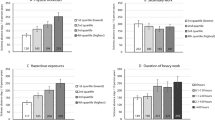Abstract
Since sickness absence causes great losses for both individual employees and their companies, decreasing sickness absence is one of major concern in occupational healthcare field. We conducted worksite-based study to elucidate the influence of lifestyle, medical findings and present illness on sickness absence of 1 week or longer during the fiscal year. Subjects were 6,010 Japanese male employees in a large telecommunication telephone company, aged 30 to 59 (the mean age 46.3±6.7 years), who had health check-up of in the fiscal year from 1991 to 1998 consecutively. We used data mining methods, such as ‘the Association Rule Analysis’, ‘the Correlation Coefficient Analysis’, and ‘the Risk Ratio Analysis’, to elucidate interrelationships in sickness absences, lifestyle (healthy / unhealthy), medical findings (normal / abnormal), and present illness (non-existent / existent), that were surveyed consecutively in the fiscal year from 1991 to 1998. In present illness, secular trend of Risk Ratio showed different patterns according to present illness category. Our results may contribute preventing sickness absence in Japanese worksite.
Preview
Unable to display preview. Download preview PDF.
Similar content being viewed by others
References
Prins, R., De Graaf, A.: Comparisons of sickness absence in Belgian, German, and utch firms. Br. J. Ind. Med. 43, 529–536 (1986)
Bourdonnais, R., Vinet, A.: L’absence au travail comme indicateur de santé signification, mesures et conditions d’utilisation. Rev. Epidémiol, Santé Publique 37, 173–182 (1989)
Kristensen, T.S.: Sickness absence and work strain among Danish slaughterhouse workers: an analysis of absence from work regarded as coping behaviour. Soc. Sci. Med. 32, 15–27 (1991)
Chevalier, A., Goldberg, M.: L’absence au travail: indicateur social ou indicateur de santé? Sci. Soc. Santé 10, 47–65 (1992)
Muto, T., Sumiyoshi, Y., Sawada, S., Momotani, H., Itoh, I., Fukuda, H., Taira, M., Kawagoe, S., Watanabe, G., Minowa, H., Takeda, S.: Sickness absence due to mental disorders in Japanese workforce. Ind. Health 37(2), 243–252 (1999)
Author information
Authors and Affiliations
Editor information
Editors and Affiliations
Rights and permissions
Copyright information
© 2003 Springer-Verlag Berlin Heidelberg
About this paper
Cite this paper
Sugimori, H., Iida, Y., Suka, M., Ichimura, T., Yoshida, K. (2003). Data Mining for Seeking Relationships between Sickness Absence and Japanese Worker’s Profile. In: Palade, V., Howlett, R.J., Jain, L. (eds) Knowledge-Based Intelligent Information and Engineering Systems. KES 2003. Lecture Notes in Computer Science(), vol 2774. Springer, Berlin, Heidelberg. https://doi.org/10.1007/978-3-540-45226-3_56
Download citation
DOI: https://doi.org/10.1007/978-3-540-45226-3_56
Publisher Name: Springer, Berlin, Heidelberg
Print ISBN: 978-3-540-40804-8
Online ISBN: 978-3-540-45226-3
eBook Packages: Springer Book Archive



